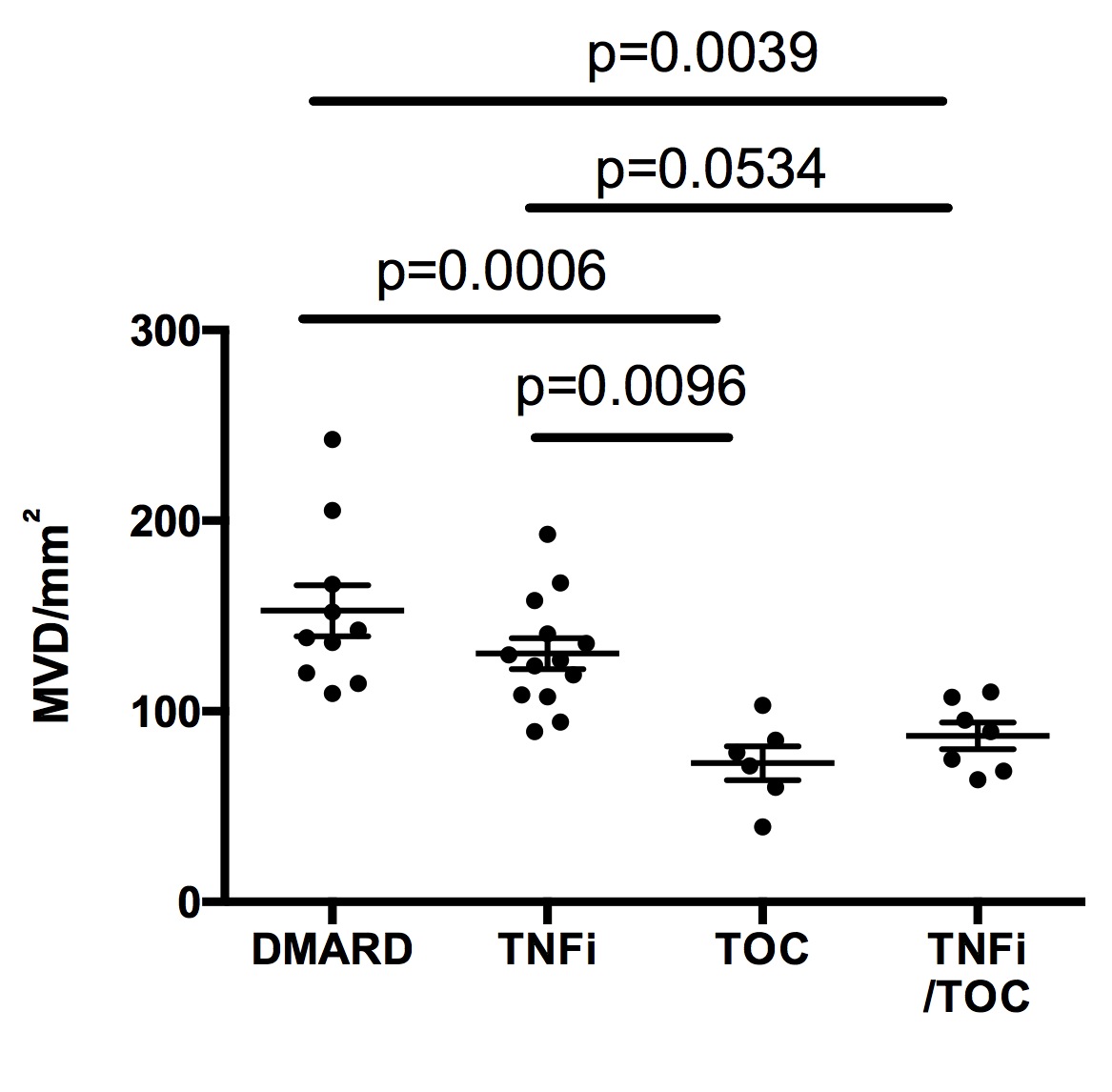Session Information
Date: Tuesday, November 10, 2015
Title: Rheumatoid Arthritis - Clinical Aspects IV: Biomarkers, Disease Progression and Treatment Response
Session Type: ACR Concurrent Abstract Session
Session Time: 2:30PM-4:00PM
Background/Purpose: Rheumatoid arthritis (RA) is a chronic inflammatory disease
characterized by hyperplasia of synovial tissues, leading to the destruction of
joint structures. TNF inhibitors, including anti-TNF-a
antibodies and soluble TNF receptors, have been shown to result in
characteristic discoid fibrosis in the deep lining layer of the synovium, probably by their action on synovial cells
thereof. Whereas IL-6 blockade tocilizumab has
comparable beneficial effects in the treatment of RA, its detailed mechanism
actions have not been fully understood. Since angiogenesis plays a pivotal role
in the pathogenesis of RA, the current studies were carried out to compare the influences
of tocilizumab and TNF inhibitors on the angiogenesis
in synovial tissues of RA patients.
Methods: Synovial tissues were obtained during the joint surgical operations
from 13 RA patients who had been treated with tocilizumab
for at least 4 months (4-47months), 7 of whom had been
previously received TNF inhibitors. As a control, synovial tissues were
similarly obtained from 13 RA patients who had received TNF inhibitors and from
10 RA patients who had not been given only non-biological DMARDs. Synovial tissues were fixed in formaldehyde
and embedded in paraffin. The sections were evaluated by hematoxylin
and eosin stain as well as by immunohistological
staining with anti-CD31 in which the microvessel densities
(MVD) were quantitated under microscopy. Synovial histopathology was evaluated
and scored for lining layer proliferation, stromal proliferation and
inflammatory changes.
Results: The most remarkable change
in the synovium from RA patients treated with tocilizumab was the reduced angiogenesis as well as the degeneration
of lining layers in the synovium. irrespective of the previous use of TNF inhibitors. Thus, MVD in patients treated with tocilizumab with or without previous TNF inhibitors were
significantly decreased compared with those in patients with TNF inhibitors
alone or in patients with non-biological DMARDS (Figure). Moreover, MVD was significantly correlated with lining layer
scores, but not with synovial stromal proliferation or inflammatory changes.
Conclusion: These results disclosed
that inhibition of angiogenesis is a primary action of tocilizumab.
Moreover, the data also suggest that the proliferation of synovial cells in the
lining layers might be closely associated with angiogenesis in the sublining layers.
To cite this abstract in AMA style:
Shunsei H, Abe A, Murasawa A, Tomita T, Yoshikawa H. Differential Effects of IL-6 Blockade Tocilizumab and TNF Inhibitors on the Reduced Angiogenesis and Lining Layer Degeneration in Synovial Tissues from Patients with Rheumatoid Arthritis [abstract]. Arthritis Rheumatol. 2015; 67 (suppl 10). https://acrabstracts.org/abstract/differential-effects-of-il-6-blockade-tocilizumab-and-tnf-inhibitors-on-the-reduced-angiogenesis-and-lining-layer-degeneration-in-synovial-tissues-from-patients-with-rheumatoid-arthritis/. Accessed .« Back to 2015 ACR/ARHP Annual Meeting
ACR Meeting Abstracts - https://acrabstracts.org/abstract/differential-effects-of-il-6-blockade-tocilizumab-and-tnf-inhibitors-on-the-reduced-angiogenesis-and-lining-layer-degeneration-in-synovial-tissues-from-patients-with-rheumatoid-arthritis/

